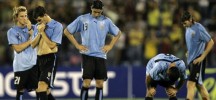On my last day in Los Angeles, my friend Vero woke me up a few minutes after seven when the world cup´s Uruguay-Mexico game was already in progress on the giant screen TV, double the size of the biggest TVs that well to do people have in Uruguay. To maximize my time, I got to do my daily workout, minus the cardio, in front of the TV. We had to get ready shower, etc and drive all the way from beautiful Woodland Hills in the Valley, down to LAX airport.
Between abs and biceps workout, I would cheer for URUGUAY, my national team. The night before, my friend Michelle´s Greek and therefore soccer-savvy boyfriend and a Mexican waiter at my favorite LA sushi bar Something´s fishy had both predicted a tie. Since both Mexico and Uruguay would go on to the second round of the world cup if they tied, people assumed both teams would choose the easy way out and aim for a 0-0 result.
I had then been reminded of a character in my upcoming decathllon film RAUL, who quits the 1500 meters race because he already has all the points he needs to get a medal. At the time I had been appalled by this behaviour. I thought it was against everything that the sports’ spirit is about.
Fortunately, the predictions had been wrong. Uruguay fought to win from the first minute, and win they did. It was a happy ride for me and Vero, when we were on the phone congratulating each other with all our LA-based Uruguayan friends.

At the Los Angeles aiport, I honored my longtime ritual of leaving the US by buying the latest copy of the New Yorker. As a showbiz worker I always tend to read book and movie reviews first. This time was different. Having just come from the Los Angeles Film Festival seminar on new trends in digital distribution, a note on ESPN’s first ever 3d transmission of a soccer match caught my eye.
The journalist appointed by the New Yorker to talk about a soccer world cup game broadcast said that he didn’t understand soccer because they didn’t use their arms, which was sort of silly, since arms can do so much (!!!!!) and he also said that he always thought soccer was just a lot of running around and kicking the ball randomly.
I also read a note about predictions for the world cup that said that Uruguay was “an ordinary team that relies on physical play.”
Being a big fan of the New Yorker, I was first baffled and then appalled by the fact that they would hire people who have NO IDEA about soccer to write about the world cup. The comments of the guy who wrote about the ESPN transmission, basically saying that soccer was sort of wrong because it was not what he was accustomed to in America, namely baseball and basketball, was to me a display of the same attitude of the American tourist who goes to Turkey and looks for a McDonalds to eat, instead of trying the HEAVENLY Turkish food.
I had never associated this kind of narrowmindedness with the New Yorker and I have to say that my advice to them is they should hire people who ACTUALLY KNOW soccer to write about it and the world cup. I believe that it is very disrespectful to tell millions of people around the world who are following the world cup with great interest and excitement that they are sort of wrong, because baseball is better.
NEW YORKER: Next time, hire someone who understands the beauty of soccer and the joy it brings to people in the remotest corners of the world.
Since I read the piece that said Uruguay was an ordinary team, we have won two more games, and we are now in the TOP FOUR. The people in Uruguay are happier than they have ever been in 40 years, and that must mean something. I believe that good things are ahead.
The lesson about not giving up and not settling when you can reach for something higher is a tremendously valuable thing we have learnt from our national soccer team during the world cup. But I guess that is beyond comprehension for those New Yorker writers. You see, in South America, and especially in URUGUAY, a world cup win can transform the world. Three million people cheered in unison yesterday, when we beat Ghana at the world cup and entered the top FOUR. That must have been an awfully powerful cheer, and I think the rest of the world is hearing it as well now.



I just read this in the New York Times as well:
Walter Gargano, 25, personifies garra charrúa, the words Uruguayans use to describe the hard men who hold down the middle of the field.
NOW, garra charrua actually means the inner strength and the stamina of the uruguayan people, it actually means charrua paw, which refers to the charruas, the aboriginal inhabitants of the Uruguayan territory, who are said to have been very brave.
I guess writing about soccer in NY requires no special qualifications…